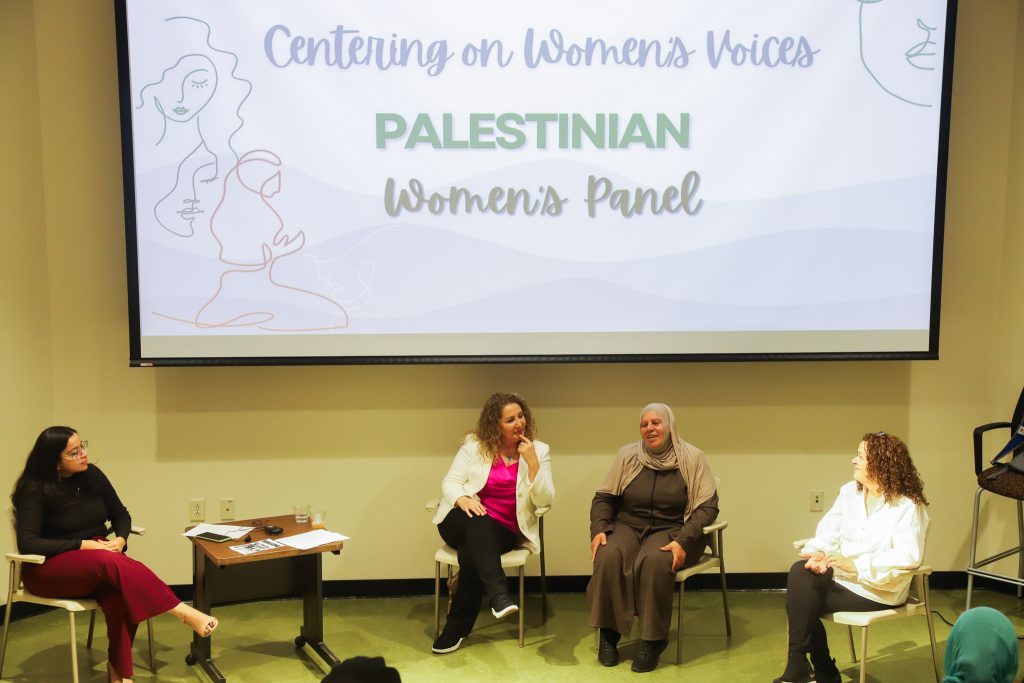Three Palestinian women shared personal stories while reflecting on identity and continued struggle in a wide-ranging panel discussion on Tuesday.
The talk, held at 6 p.m. in the Admissions Building, featured three speakers, identified as Reem, Mai and Laila. The discussion was the first event hosted by the newly formed Binghamton Graduate Students for Justice in Palestine in collaboration with the Students for Justice in Palestine and the Powerful United Ladies Striving to Elevate. A representative from the GSJP’s E-Board moderated the conversation.
“It is imperative as activists who want to push for Palestinian Liberation that we elevate Palestinian voices as they are the ones most deeply impacted by the ongoing genocide in Gaza and the Apartheid regime in the West Bank,” GSJP wrote to Pipe Dream. “We wanted to host an event for Palestinian women to have their voices heard, and the speakers that volunteered did so because they saw the importance of sharing their stories and perspectives for the students here at Binghamton University. We commend them for their strength and resilience in the face of adversity, and hope to continue to spread awareness for the people of Palestine until Palestine is finally free.”
Each of the women began by introducing themselves to the audience of students and community members. Mai — a Palestinian woman born in Kuwait — described her internal struggle as someone who “never had a country to belong to” after moving between different nations like Saudi Arabia, the United Arab Emirates, Jordan and now the United States, residing in the Binghamton area for the past five years.
Another panelist, Laila, is from Palestine and recounted her experiences living in and visiting the West Bank. Reem was born in Lebanon to refugee parents and attended Palestinian-only schools operated by the United Nations Relief and Works Agency, established in 1949 to provide relief, work and education programs for Palestinian refugees.
The three panelists emphasized the importance of educating people — particularly students — about Palestinians’ lived experiences. Laila highlighted the role that continuous student protests play in promoting solidarity and challenging U.S. foreign policy in the region. Reem said there has been a shift toward greater awareness of Palestinian identity in the United States over the last few decades and highlighted the importance of dispelling American assumptions about Palestinians.
Mai and Reem described the role they feel education plays in Palestinian culture, with Mai commenting that education and food are key cultural elements that parents teach their children to value. Reem shared the emphasis her father placed on education following her decision to stop attending college to work with the United Nations.
“So what my dad did for six or seven years, every single year he registered me in college and he told me ‘you will finish and you have to graduate from college,’” Reem said. “Because for Palestinians, the college degree is like a weapon, and this is what he always told me, this is our weapon. When we are educated, we can be strong — especially for women — and he always told me that ‘I care that you graduate from college more than your brothers because when you are a college student, you can stand up strong in front of any obstacles or any problems in your life.’”
In response to a question about safety and finding support, Reem said the right to express her identity gives her a sense of security. Laila said Palestinian women have never felt safe, referencing the presence of Israeli settlers and the Israel Defense Forces in the West Bank.
The speakers repeatedly emphasized that they do not believe in religious discrimination, with several referencing stories about how Jewish, Christian and Muslim people lived in relative peace before the 1948 Arab-Israeli War and the forced displacement of Palestinians from their homes — an event referred to in Arabic as the Nakba.
In a statement to Pipe Dream, SJP described the panel’s significance, especially considering how the media often ignores Palestinian voices.
“Palestinian women often bear the brunt of Israel’s systematic oppression, which is further exacerbated when the dominant narrative tries to distort their struggles — but this makes it all the more essential to highlight their central role in the Palestinian liberation movement,” SJP wrote. “The panelists emphasized the role of education in resisting Israeli occupation, but as college students in the U.S., we must take it as a call for solidarity and to ensure that the Palestinian struggle for freedom is told in all its depth and complexity — through the voices of those living it every day. It is through listening, learning, and standing in solidarity that we can dismantle the harmful narratives that perpetuate injustice.”
The moderator then opened the floor to questions. After a question was raised about whether Israeli occupation in the West Bank has changed, Laila said settlers there have become emboldened as media attention has focused primarily on the Gaza Strip. Data from the United Nations indicated that at least 730 Palestinians have been killed in the West Bank between Oct. 7, 2023 and Oct. 14, 2024.
The event comes two weeks following a rally and vigil organized by SJP to mark the first anniversary of Oct. 7.
“As students of this university, and as human beings, we have a moral responsibility to help end the suffering of our Palestinian sisters and brothers at the hands of their oppressors,” PULSE wrote in a statement to Pipe Dream. “This responsibility begins with making sure we are educated on the state of the current genocide and how it is impacting the Palestinian people. This panel allows us to do just that. By hearing from Palestinian women who have direct connections to this conflict, we are able to gain some perspective on how our personal actions contribute to their suffering, and consequently are moved by their words to really create a change in our behavior.”



